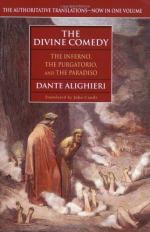Wherefore I pray thee, father, whom this heart
Holds dearest! thou wouldst deign by proof t’ unfold
That love, from which as from their source thou bring’st
All good deeds and their opposite.’” He then:
“To what I now disclose be thy clear ken
Directed, and thou plainly shalt behold
How much those blind have err’d, who make themselves
The guides of men. The soul, created apt
To love, moves versatile which way soe’er
Aught pleasing prompts her, soon as she is wak’d
By pleasure into act. Of substance true
Your apprehension forms its counterfeit,
And in you the ideal shape presenting
Attracts the soul’s regard. If she, thus drawn,
incline toward it, love is that inclining,
And a new nature knit by pleasure in ye.
Then as the fire points up, and mounting seeks
His birth-place and his lasting seat, e’en thus
Enters the captive soul into desire,
Which is a spiritual motion, that ne’er rests
Before enjoyment of the thing it loves.
Enough to show thee, how the truth from those
Is hidden, who aver all love a thing
Praise-worthy in itself: although perhaps
Its substance seem still good. Yet if the wax
Be good, it follows not th’ impression must.”
“What love is,” I return’d, “thy words, O guide!
And my own docile mind, reveal. Yet thence
New doubts have sprung. For from without if love
Be offer’d to us, and the spirit knows
No other footing, tend she right or wrong,
Is no desert of hers.” He answering thus:
“What reason here discovers I have power
To show thee: that which lies beyond, expect
From Beatrice, faith not reason’s task.
Spirit, substantial form, with matter join’d
Not in confusion mix’d, hath in itself
Specific virtue of that union born,
Which is not felt except it work, nor prov’d
But through effect, as vegetable life
By the green leaf. From whence his intellect
Deduced its primal notices of things,
Man therefore knows not, or his appetites
Their first affections; such in you, as zeal
In bees to gather honey; at the first,
Volition, meriting nor blame nor praise.
But o’er each lower faculty supreme,
That as she list are summon’d to her bar,
Ye have that virtue in you, whose just voice
Uttereth counsel, and whose word should keep
The threshold of assent. Here is the source,
Whence cause of merit in you is deriv’d,
E’en as the affections good or ill she takes,
Or severs, winnow’d as the chaff. Those men
Who reas’ning went to depth profoundest, mark’d
That innate freedom, and were thence induc’d
To leave their moral teaching to the world.
Grant then, that from necessity arise
All love that glows within you; to dismiss
Or harbour it, the pow’r is in yourselves.
Remember, Beatrice, in her style,
Denominates free choice by eminence
The noble virtue, if in talk with thee
She touch upon that theme.” The moon,
Holds dearest! thou wouldst deign by proof t’ unfold
That love, from which as from their source thou bring’st
All good deeds and their opposite.’” He then:
“To what I now disclose be thy clear ken
Directed, and thou plainly shalt behold
How much those blind have err’d, who make themselves
The guides of men. The soul, created apt
To love, moves versatile which way soe’er
Aught pleasing prompts her, soon as she is wak’d
By pleasure into act. Of substance true
Your apprehension forms its counterfeit,
And in you the ideal shape presenting
Attracts the soul’s regard. If she, thus drawn,
incline toward it, love is that inclining,
And a new nature knit by pleasure in ye.
Then as the fire points up, and mounting seeks
His birth-place and his lasting seat, e’en thus
Enters the captive soul into desire,
Which is a spiritual motion, that ne’er rests
Before enjoyment of the thing it loves.
Enough to show thee, how the truth from those
Is hidden, who aver all love a thing
Praise-worthy in itself: although perhaps
Its substance seem still good. Yet if the wax
Be good, it follows not th’ impression must.”
“What love is,” I return’d, “thy words, O guide!
And my own docile mind, reveal. Yet thence
New doubts have sprung. For from without if love
Be offer’d to us, and the spirit knows
No other footing, tend she right or wrong,
Is no desert of hers.” He answering thus:
“What reason here discovers I have power
To show thee: that which lies beyond, expect
From Beatrice, faith not reason’s task.
Spirit, substantial form, with matter join’d
Not in confusion mix’d, hath in itself
Specific virtue of that union born,
Which is not felt except it work, nor prov’d
But through effect, as vegetable life
By the green leaf. From whence his intellect
Deduced its primal notices of things,
Man therefore knows not, or his appetites
Their first affections; such in you, as zeal
In bees to gather honey; at the first,
Volition, meriting nor blame nor praise.
But o’er each lower faculty supreme,
That as she list are summon’d to her bar,
Ye have that virtue in you, whose just voice
Uttereth counsel, and whose word should keep
The threshold of assent. Here is the source,
Whence cause of merit in you is deriv’d,
E’en as the affections good or ill she takes,
Or severs, winnow’d as the chaff. Those men
Who reas’ning went to depth profoundest, mark’d
That innate freedom, and were thence induc’d
To leave their moral teaching to the world.
Grant then, that from necessity arise
All love that glows within you; to dismiss
Or harbour it, the pow’r is in yourselves.
Remember, Beatrice, in her style,
Denominates free choice by eminence
The noble virtue, if in talk with thee
She touch upon that theme.” The moon,




